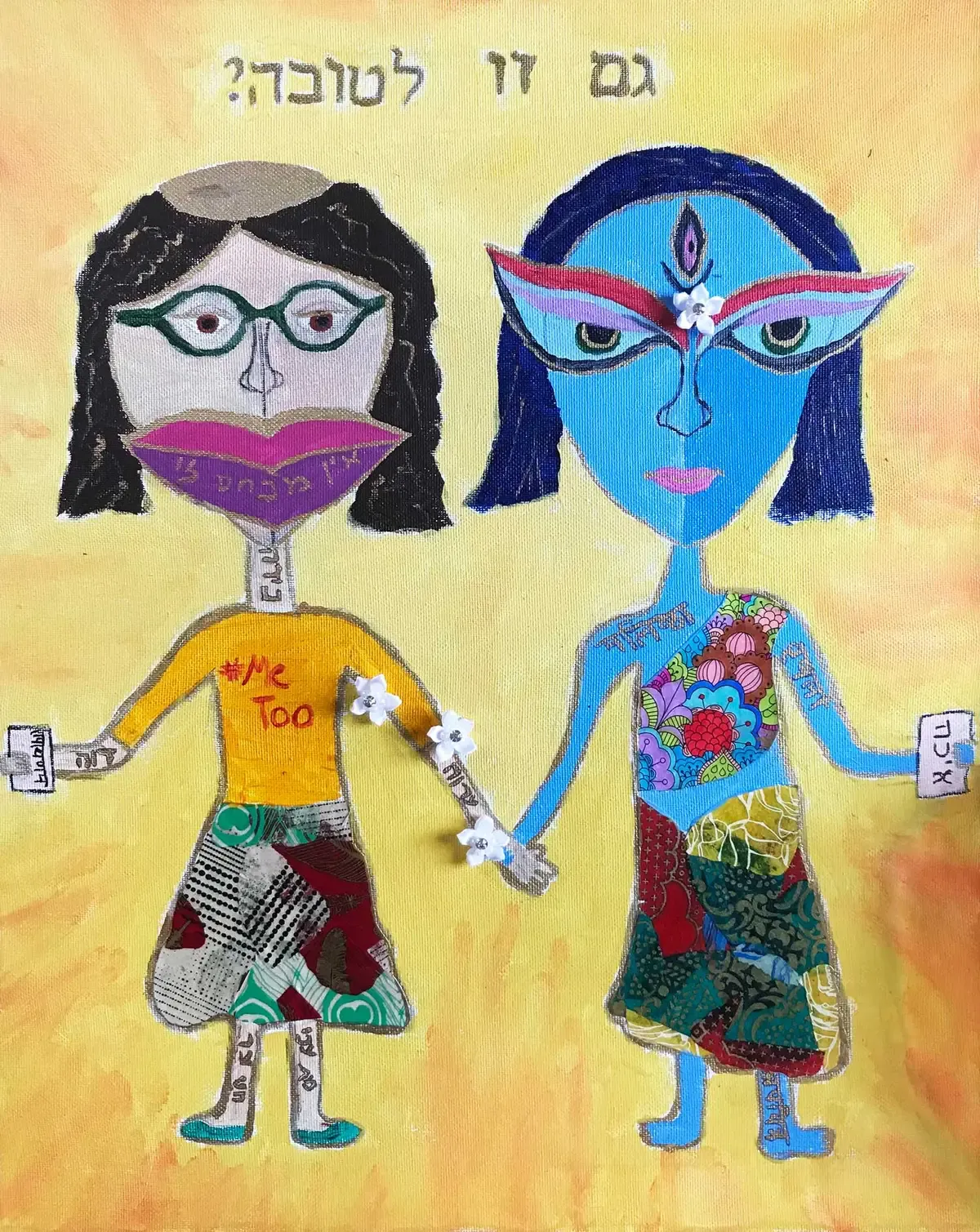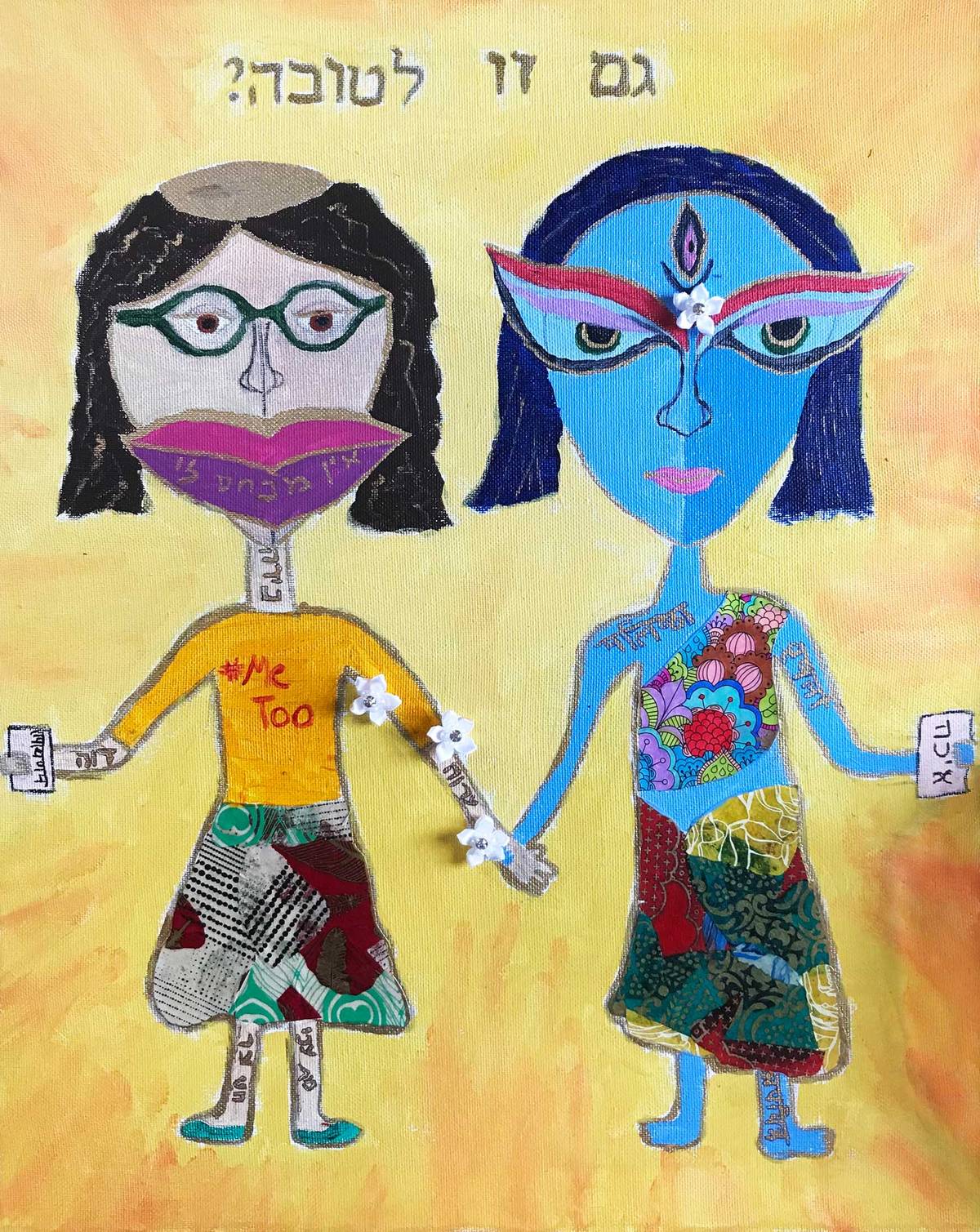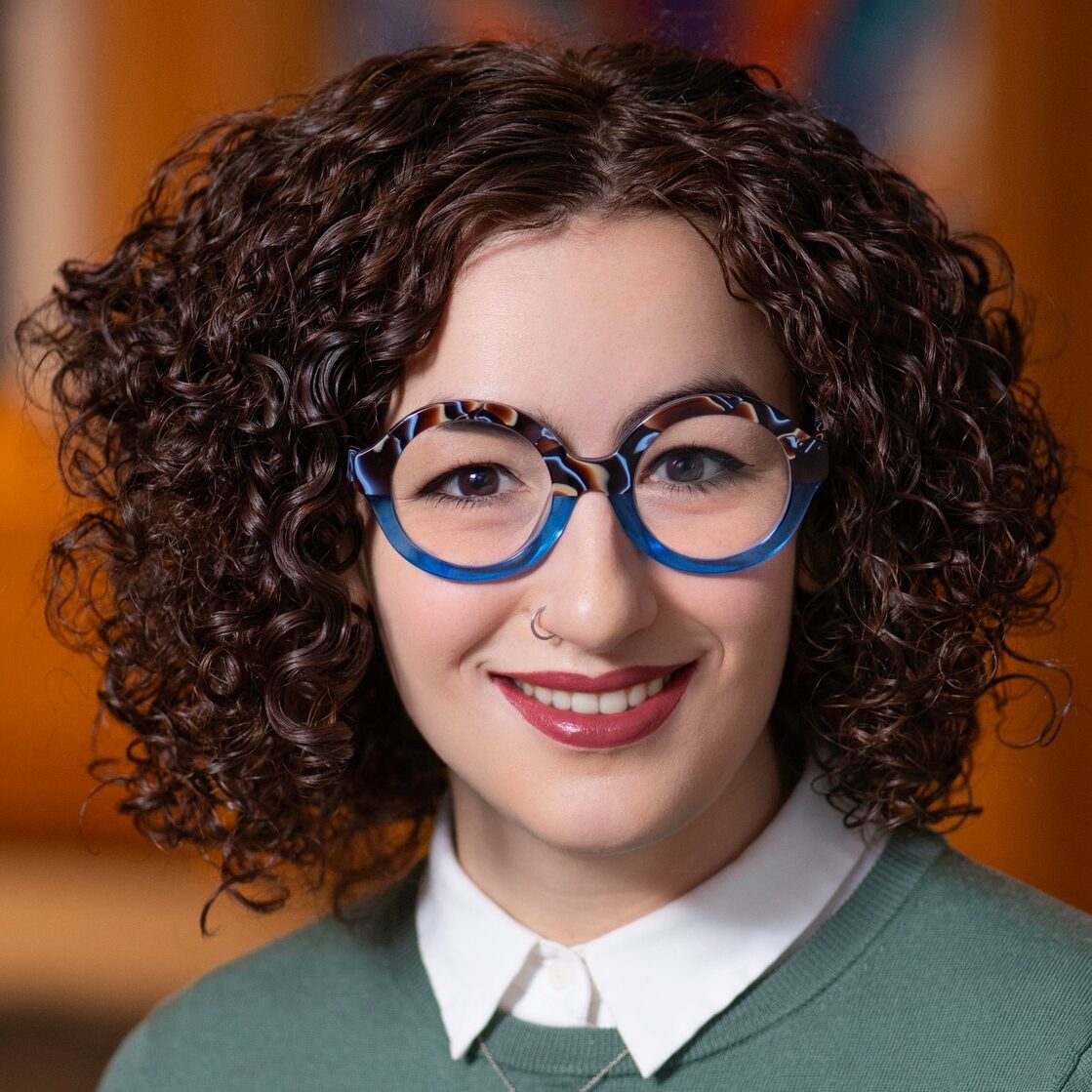GUEST POST: On Tisha B'Av, Grief and Transformation After Assault, by Rabbi Amalya Volz
On seeking-- and finding-- God even in the horrors that defy explanation.

This is Life as a Sacred Text 🌱, an everybody-celebrating, justice-centered voyage into ancient stories that can illuminate our own lives. It‘s run on a nonprofit, so it’s 100% NAZI FREE. More about the project here, and to subscribe, go here:
Tonight begins Tisha B'Av, the 9th of Av, on which Jews mourn the destruction of the First and Second Temples by the Babylonians and Romans, respectively, the 1492 Edict of Expulsion from Spain, and many more great calamities over the centuries.
Here is a powerful Tisha B'Av supplement from members of the Halachic Left and All That’s Left– two Jewish anti-Occupation groups. Notably, it includes the text of Lamentations /Eicha typeset so that it has border commentary (Rashi/Tosafot style) comprised of stories from Gaza from this year. If you are able to (Trigger warning: there is violence, including against children, but I think they were careful in their selection of stories [[a]] ). Jews: No more looking away.
It also includes a Misheberach [[b]] for an End to Bloodshed, a thing I didn't understand I needed until I suddenly, desperately, understood that I'd needed it all along.
[[a]]: There is nothing I would categorize as graphic– which is not to say "not brutal" or "acceptable." [[b]]:A type of prayer that asks for divine blessing.I've written about the sexual violence in the Book of Lamentations (read on Tisha B'Av) before, and when I read this powerful piece by the wonderful Rabbi Amalya Volz, I thought it might resonate profoundly with some folks, on a range of possible levels.
We will return with Part Three of our Jesus and the Rabbis conversation next week.
Trigger warning: Sexual violence, sexual assault. Also: Personal and theological healing and repair. ❤️🩹
Also This? On Tisha B'Av, Grief and Transformation After Assault
by Rabbi Amayla Volz
When I was twenty, I was living in Jerusalem and was studying at the Conservative Yeshiva [[1]] for the first time. On the day before Tisha b’Av, I was walking home from a dinner and I was stalked and sexually assaulted by a stranger. Because of how the attack unfolded, I was genuinely surprised to have remained alive at the end. My entire life changed in an instant. I felt disgusting and violated in every way it is possible to feel violated. I suppose it’s because I’m a very pragmatic person, but I basically told myself I was fine. I’ve been through a lot of other challenging things in my life, and I’ve never known any other way of dealing with them but to accept what happened and move forward.
I think I also didn’t want to accept the reality and depth of what had happened. I was recently watching a video of a woman telling the story of her rape, and she said that the most shameful part of it for her was that “he made me into a victim, and I didn’t want to be a victim.” I was raised not to take nonsense from anyone, to not be anyone’s doormat, and especially never to let a man define my reality or identity. This man invaded my life and body and forced me to become a victim to an unimaginable crime. He forced me to grapple with the fact that I am not the sole person in control of what happens to my body.
The assault itself was obviously extremely traumatic, but the fact that it occurred the day before Tisha B’Av magnified the level of trauma to an unmanageable degree: Having grown up in a very secular Jewish context, this would be the first time I had ever heard of or celebrated Tisha B’Av.
The very day after the assault, I was thrown into a holiday whose practices almost exactly mirrored the hell I was going through.
At every level of Tisha B’Av, there is pain and personal resonance for me. The only word I know to call the experience, both of the assault itself and of Tisha B’Av, is “horror.”
The first challenge is Eicha—the Book of Lamentations, which we read on the holiday—particularly the first two chapters. When we read the text, we see the story of an anthropomorphized female Jerusalem, who has been sexually brutalized and stands alone and humiliated. What is worse is the fact that the text positions this all as her fault, as a punishment from God. The words that she is called—nidah (impure), davah (anguished), ervah (shameful)—felt like taunts repeating the words that I already felt about myself in the aftermath of the assault. I felt like those words had been branded on my chest and represented what I was to the world now.
The refrain “ein menachem li”—“there is no one to comfort me”—was an echo of how alone I felt.
I suppose that some people would find it comforting to read a text that mirrors a personal experience of theirs, but for me it is too painful to listen to Eicha chanted. Rabbi Alan Lew wrote that
“the Great Temple of Jerusalem was the navel of the universe, the earthly locus where Israel felt its connection to the Divine Presence in a palpable way. So Tisha B’Av is primarily about the loss of this connection and the calamity that comes in the wake of this loss.”
The experience of being assaulted tore away the sense of security that I had felt in my body; it made the walls come crumbling down. This was only reinforced by the fact that on Tisha B’Av, we commemorate the exact same thing happening to the Temple.
And then there are all of the physical practices of Tisha B’Av. Pretty much everything we are expected to do (or not do) to our bodies on the holiday is an exact mirror of how I treated myself in the few days after the assault. I couldn’t eat, I didn’t change my clothing, I didn’t shower or dare to look at myself at all. What I am doing right now is a retelling of my story, which puts me in a position of power and control, but undertaking these practices actually makes me relive the experience.
Obviously, there is no good day on which to be assaulted, but I believe that Tisha B’Av is the worst possible day that it could have happened. I will never be able to escape this forced reliving of one the worst moments of my life. And it’s not as if Tisha B’Av is really only one day—it’s a weekslong process of mourning and afflictive rituals. Up until recently, I have always felt alone on this day; the fact that people aren’t even supposed to greet each other on Tisha B’Av has made me feel like I and my experience don’t exist. The existence of Tisha B’Av has made it nearly impossible to move forward in the way I have learned. Tisha B’Av for me is really a yahrzeit– the anniversary of a death– and it’s a yahrzeit that is so many times more difficult than my own father’s actual yahrzeit.
On Tisha B’Av, I mourn the person I was before the assault took place.
It took me so long to use the term “mourning” to describe my feelings, because I didn’t want to admit I would never be who I once was—but that is the nature of sexual assault: You will never be the person you were before. I had to call this “grief” and learn to befriend my grief. I mourn my innocence, and the feeling of security in the world.
In 2022, I decided to light a yahrzeit candle to commemorate this experience. I also took the step of asking for a formal heter (rabbinic dispensation) not to be required to fast on this fast day from my rav, my rabbi, Eliora Peretz. I did this not because I need permission to take care of myself or because I can’t make my own halachic [Jewish legal] decisions, but because of the symbolism. To me, a heter is a formal acknowledgement from my tradition that what happened to me was real and significant. When I received the heter in my email, I was overcome with emotion. To read the words—in all caps—“you have a HIYUV [obligation] to eat” made me swell with gratitude and vindication.
I saw the musical Hadestown, which starts and ends with the same song and dialogue, last year. The story does not have a happy ending, but at the end of the show the characters start telling it again anyhow. The narrator says,
“It’s a sad song, but we sing it anyway/ cause here’s the thing / to know how it ends / and still begin to sing it again / as if it might turn out this time.”
I know that no amount of retelling will change the events that happened nine years ago, but I do feel that in the recitation I am able to reach new levels of peace and acceptance, and that something shifts internally each time I retell the story.
On Tisha B’Av, we recall not only the destruction of both Temples, but also all calamities that occurred to the Jewish people on and around this date. Lew calls this “the way our tradition has collapsed history on this day.”
We have a tradition of kinnot (elegies) that we read, because Lamentations itself is not enough to narrate the various tragedies that took place on this day. Of course, I am writing about something that happened personally to me and not to the Jewish people as a whole, but I still feel that what I am doing here is a type of personal kinnah.
Lia Purpura, an author and poet, has an essay in her book On Looking in which she watches an autopsy take place. Standing next to the man she will soon see opened, she writes:
“Have I thought of the body as a sanctuary? A safe, closed place like the ark from which the Torah is taken and laid out on a table to be unscrolled. The two sides parted, opened like, soon I’d know, a rib cage, that a hand with a sharp-tipped pointer might lead the way over, reading toward depth.”
As I write about this story, I think of this visual that Purpura creates. I think of someone carrying my body around the synagogue and placing me on the bimah, cutting down my sternum, and opening my chest to reveal my beating heart. This is exactly what we do to the sefer Torah, the Torah scroll every week.
I think of how much vulnerability we ask of the Torah scroll when we read her, and how the klaf, the parchment is as vulnerable and internal as the human heart. By opening and unrolling the Torah scroll, we put it at risk of damage, but we’d never be able to read the stories inside without doing so.
To tell a story is inherently to open to a place of intense vulnerability and risk, but without doing so we’d never arrive at the heart of the matter—whether our own physical hearts or the beating heart of our people (the Torah).
At the end of one of my years of rabbinical school, my teacher, my rebbe, the aforementioned Eliora, gave me a leather-bound Tisha B’Av machzor. That whole year I was able to work with her, both in our mussar class and individually, on so much of the theological pain I’ve carried around. It’s because of how she taught me and saw me that I’m able to have the courage and wisdom to be here today. When she gave me this book, she told me that Tisha B’Av would be a day that she’d think about me for the rest of her life, but since she won’t be able to be there with me in person, she wants me to have this piece of her on this day. The other thing about the siddur is that it is hardcover. Recently, my friend Rabbi Tanya Farber was telling me about how there’s a chumra (stringency) only to print kinnot, elegies in paperback, so there’s an extra meaning to the fact that this siddur is hardcover and leather-bound. It’s a way of stating that my pain is real and permanent, something that tangibly exists in this world.
The question of where to locate God in all of this had eaten away at me for years. Being assaulted completely shattered my theology. I couldn’t understand how God could have done this to me, or how I could even be able to believe in God in the face of what I’d gone through. I wanted to know why this happened and for years was unwilling to accept that there would never be a legitimate answer found. There were times I wanted nothing to do with observance or religion.
One of the things I’ve recently realized, though, is that to blame God is to say that the fault does not lie with my assailant.
In a sermon on the Ten Commandments, Rabba Tamar Elad-Appelbaum says that the word anochi (“I” or “I am,” the first word of the Ten Statements, as we call them) is foundational to an authentic Torah-based life. She says:
“anochi is the story that I bring with me when I experience the law.”
Laws don’t hold any meaning unless someone is brave enough to come forward and say anochi, to say that something difficult happened to me. [[2]]
This is also what God does, and did. The Mekhilta d’Rabbi Yishmael teaches that when God stood and said “anochi,” the mountains and hills shook and collapsed. In the Zohar, Rabbi Yosi says that “anochi” is the name of the Shekhina– the immanent aspect of the divine. Rabba Tamar uses these texts to teach that the purpose of Jewish law is to uncover injustices that might be hidden from us, and that the existence of these laws is testament to the ways that humans have hurt each other.
By telling my story today, I am saying anochi, I am saying #MeToo, and I am bringing this experience from a place of darkness out into the light. Oraita—the Aramaic word for the Torah—has at its root the word or, light, and I am using Torah as a vehicle for shedding light on what happened to me.
One piece that was transformative in my theological healing came from Rabbi David Weiss Halivni’s The Book and the Sword.
Halivni was a Holocaust survivor, and talks about his belief that God detests people who try to theologically justify the Shoah, or to even ask the question of why God let it happen. To ask this question is to assert that an answer exists, to imply that there is a justification for the Holocaust.
He argues that even asking this question increases the suffering of the victims and survivors, and also removes due blame from the actual perpetrators, the Nazis—his exact words are,
“The very question reduces the innocence of the victims and the culpability of the perpetrators.”
There are certain events that exist without any explanation—Halivni argues that both Revelation and the Shoah are examples. I feel comfortable putting my assault in this category as well: It simply happened, and I don’t need to ask why. I love this idea that God hates that I would even ask myself why it happened, and I’m in a place where I feel confident that God also hates the fact that I was assaulted.
This brings me back to Rabba Tamar’s d’var Torah. She says that the Ten Commandments show that the Shekhina was hurt by human misdeeds, but chose to stay in this world and give us the Torah anyhow. God saw humans hurting each other, and spoke out to say anochi and give us laws to teach us how not to treat each other. The Shekhina didn’t have to stay in this world with us, but she did.
This idea feels very close to my own experience: I could have easily chosen not to stay in the world of Torah, of God, and of observance, but I did. Even though it’s been very hard for me. Listening to people’s stories is making room for the Shekhina to say anochi, to tell us that she is hurting.
When I hurt, I know that God hurts along with me.
Tisha B’Av ushers in the theme of teshuvah– repair, return– that will carry us through the High Holidays. I’ve always struggled with this on Tisha B’Av, because I was primarily thinking about the concept of teshuvah through the translation of “repentance.” Obviously, I can’t accept the thought that I have anything to repent for in this situation. However, I’m now thinking about teshuvah through the translation of “returning.”
My teshuvah here is that over time, I have been able to return to God, to return to the pure core of my soul that even my assailant couldn’t touch.
The writer Amy Berkowitz, in her book of poetry about experiencing rape, writes: “And in order to understand the impact of rape, we need more images on how rape stays with us—i.e., it’s not just something that happens one night.”
I want to take it a step further: We need more stories about what recovery after sexual violence looks like, not just psychologically but also theologically and spiritually. Of course, no two stories of post-survival will look identical, but my understanding of how badly I could have used a story like this eight years ago fuels my drive to be here today.
My great-grandfather, who was a Holocaust survivor, left an archive of nearly 2,000 pages, which he donated to the Leo Baeck Institute. While reading through this treasure trove, I came across a family story that he had written out. He told how his mother-in-law (who would later be killed at the Sobibor extermination camp) was in possession of a treasured siddur, prayerbook, that had been in the family for several generations. The Nazis burned this book on the night of Kristallnacht when they broke into the family home. My great-grandfather Karl was the one who had to tell my great-great grandmother of the fate of the book. His words exactly:
“She cried. Then, calmly, she said: 'Gam zu l’tova (this too, is for the good).'”
I was floored, almost to the point of anger, the first time I read this. How could she have possibly thought or said that this was all for the good?

My great-grandfather and I have both made our personal stories of pain into kinnot. After I read this story, I made a painting in which I portrayed myself standing next to Ahalya, a character from the Mahabharata who experiences sexual violence and is punished by being made invisible. I wrote “Gam zu l’tova” with a question mark, questioning the limits of the phrase and whether or not its use normalizes the trauma of women.
Now, five years after first reading the story and making the painting, I have a new appreciation for this phrase. Gam zu l’tova is not saying that this experience is good or that it was good that I was assaulted. This is what I previously had thought it had to mean. I think the key to understanding the phrase lies in the lamed—my assault isn’t tov, but it can be used le’tov—for the good.
Obviously, what I went through was and still is terrible, and I wish that I had the power to prevent any other person from experiencing something similar.
However, I can find good in this experience. I can use it for the good, and I can draw good out of it.
My assault happened in the dark, but by talking openly about it I’ve taken in so much light.
I know that I can also use what I went through as a light to other people. Even in the most bitter and most horrible of times, there is still abundant light and abundance of God’s presence.
I feel that finally, I am in a place where I can pick up the pieces of what happened to me on this day, hold them in my hands, stand in line behind my great-great grandmother, and utter: gam zu l’tova.
Rabbi Amalya Volz is a chaplain, spiritual leader and seeker, social justice organizer, and teacher of Jewish texts who was ordained as a rabbi by the Jewish Theological Seminary in May, and simultaneously received a MA in Jewish Women and Gender Studies. Rabbi Volz has served in both informal and formal roles in a number of communities in Ohio and New York, including the Cleveland Partnership Minyan, Oberlin Hillel, the Beis Community, and the Fort Tryon Jewish Center. She is passionate about writing and her publication credits include Hey Alma, eJewishPhilanthropy, Tablet, and the Times of Israel. She received a BA in Jewish Studies from Oberlin College. Follow her on Instagram.

FOOTNOTES
[[1]]: In Judaism, "Conservative" is not necessarily a reference to a political orientation, but is rather a denomination that broke away with the Reform movement shortly after its Enlightenment-era origins. The name comes from the desire to live in the modern world but to conserve certain aspects of the tradition (say, keeping more Hebrew in the liturgy, having a more evolutionary relationship to Jewish law, etc.)
[[2]]: Don‘t murder? Don’t exploit the non-citizen? Don’t take bribes if you’re a judge? Every sign has a story, and so does every law.
This post is a reprint of a publication by Tablet, run with permission of the author. Original here.
RESOURCES
- The folks at RapeIs.. have a superlative list of direct crisis lines. If you have been assaulted and are seeking support, start there.
- Pandora’s Project is a nonprofit organization dedicated to providing support, and resources to survivors of rape and sexual abuse and their friends and family.
- Blank Noise is a community/public art project that seeks to eradicate gender-based & sexual violence.
- MCSR (formerly Men Can Stop Rape) works to prevent violence by programs fostering healthy masculinity.
- Know Your IX is youth- and survivor-led project that aims to empower students to end sexual and dating violence in their schools.
🌱🌱🌱🌱🌱🌱🌱🌱🌱🌱🌱🌱🌱🌱🌱🌱🌱🌱🌱🌱🌱🌱🌱🌱🌱
Like this? Get more of it in your inbox every week. 🌱
For free every Monday—sign up at the ‘Subscribe now’ button just below.
And if you become a paid subscriber, that's how you can get tools for deeper transformation, a community for doing the work, and support the labor that makes these Monday essays happen.
A note on the subscription model:
I want my work to be as accessible to as many people as possible, in as many ways as possible. That's why the Monday essays are free, and why we donate subscriptions to anyone for whom paying is a barrier to the House of Study posts.
I also believe people should be paid fairly for their work. Needless to say, these two values sometimes seem to be in conflict, but I do what I can to find a fair balance. I offer many resources for free, and charge for others. When you donate generously or pay at the top of our scale, that helps support the work I do, provides access for those who have fewer resources, pays for the infrastructure and the technical and practical support that it takes to do this, and helps us keep the work sustainable.
And as always, if you want in to the Thursday space but paying isn't for you now, just email support@lifeisasacredtext.com and we'll hook you up.
And if you’d like to underwrite one of these donated subscriptions, you can do so by signing up at one of the higher subscription points.
And if it resonated with you, please share this post.
Sending a big pile of blessings and goodness your way. 💕




